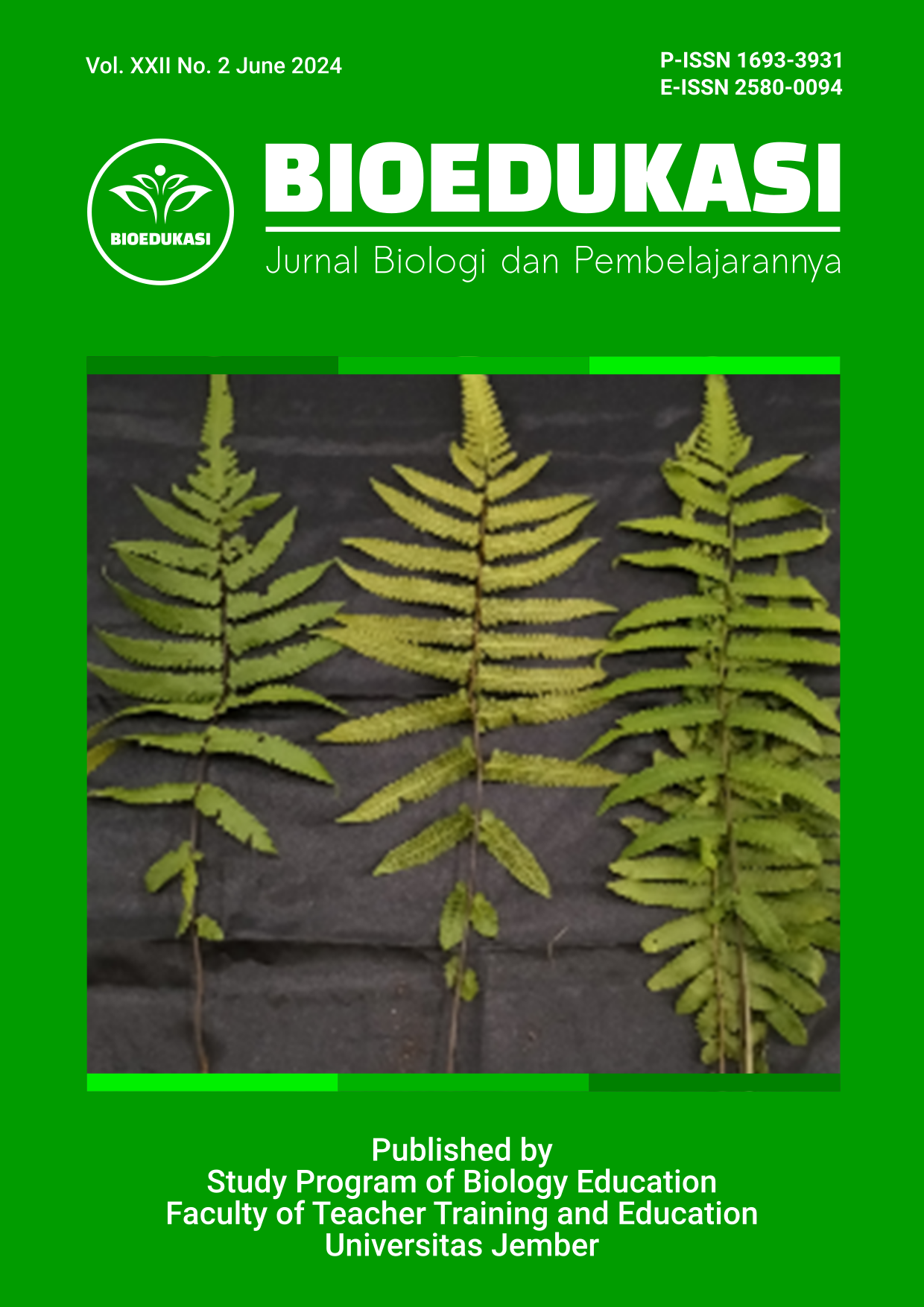Development of Pbl-Based E-Module of Transport and Substance Exchange Process to Improve Critical Thinking Skills of Senior High School Students
DOI:
https://doi.org/10.19184/bioedu.v22i2.44933Keywords:
critical thinking skills, e-modul of substance transport, exchange process, problem-based learningAbstract
21st century education must be adapted to the demands of the times so that students are able to compete in the future. One of the 21st century skills needed in learning is critical thinking. Learning that supports critical thinking skills is the problem-based learning model (PBL). The problem-based learning model can have a significant effect on critical thinking skills. Students are required to have critical thinking skills to be able to compete competitively. One of the innovations in biology learning is the development of e-module of Substance Transport and Exchange Process to train students' critical thinking skills. This e-module development uses the ADDIE development model. The e-module of the Substance Transport and Exchange Process after being validated obtained a very valid validity, namely the results of media validation obtained an average of 95.5% with a very valid category, the results of material validation were 100% with a very valid category. The results of practicality are very practical, namely individual trials (one to on trial) obtained an average of 82.22% with a very practical category, small group trials obtained an average of 86.26% with a very practical category, practicality of biology education practitioners obtained an average of 100% with a very practical category. Effectiveness test to improve students' critical thinking skills. The average result of each indicator of critical thinking skills pretest is 35.86 and posttest is 59.78 which indicates an increase in students' critical thinking skills with N-Gain results of 0.3 with moderate effectiveness category. Data on the percentage of PBL model implementation showed an average value of each stage carried out of 91.7% with a very implemented category.
Downloads
References
Andi Rustandi, & Rismayanti. (2021). Penerapan Model ADDIE dalam Pengembangan Media Pembelajaran di SMPN 22 Kota Samarinda. Jurnal Fasilkom, 11(2), 57–60. https://doi.org/10.37859/jf.v11i2.2546
Astuti, N., & Riefani, M. K. (2022). Validitas Modul Elektronik “ Pembelahan Sel †Berbasis Keterampilan Berpikir Kritis ( Validitas Modul Elektronik “ Pembelahan Sel †Berbasis Keterampilan Berpikir Kritis). 6.
Elin Driana, E. (2019). Teachers’ Understanding And Practices In Assessing Higher Order Thinking Skills At Primary Schools. 1(2), 110–118.
Fadilla, N., Nurlaela, L., Rijanto, T., Ariyanto, S. R., Rahmah, L., & Huda, S. (2021). Effect of problem-based learning on critical thinking skills. Journal of Physics: Conference Series, 1810(1). https://doi.org/10.1088/1742-6596/1810/1/012060
Fox, R. B. (1962). Difficulties in developing skill in critical thinking. Journal of Educational Research, 55(7), 335–337. https://doi.org/10.1080/00220671.1962.10882822
Fidayani, E. F., & Ammar, F. M. (2023). The Use of Azhari Curriculum in Arabic Language Learning at Islamic Boarding School. Nazhruna: Jurnal Pendidikan Islam, 6(1), Art. 1. https://doi.org/10.31538/nzh.v6i1.2866
Greenstein, L. (2012). Assessing 21st century skills: a guide to evaluating mastery andauthenticlearning. California: Corwin, AsageCompany
Hamdani, M., Prayitno, B. A., & Karyanto, P. (2019). Meningkatkan Kemampuan Berpikir Kritis Melalui Metode Eksperimen. Proceeding Biology Education Conference, 16(Kartimi), 139–145. https://jurnal.uns.ac.id/prosbi/article/view/38412/25445
Hake, R. R. (1999). Analyzing Change/GAIN SCORES. AREA-D American Education Research Association’s Devision. D.
Kusumaningtyas, D., & Yanti, E. Y. (2021). Pengembangan penuntun kegiatan belajar elektronik literasi lingkungan berbasis kearifan lokal kabupaten Malang. Jurnal Ilmiah Wahana Pendidikan, 7 (8), 292.
Lestari, D. G., & Irawati, H. (2020). Literature review : peningkatan hasil belajar kognitif dan motivasi siswa pada materi biologi melalui model pembelajaran guided inquiry. Bioma, 2(2), 51–59.
Mulyati. (2005). Psikologi Belajar. Yogyakarta: CV Andi Offset.
Permendikbud. 2014. Permendikbud No.66 Tahun 2013 tentang Standar Penilaian
Puspitasari, R., Hamdani, D., & Risdianto, E. (2020). Pengembangan E-Module Berbasis Hots Berbantuan Flipbook Marker Sebagai Bahan Ajar Alternatif Siswa SMA. Jurnal Kumparan Fisika, 3(3), 247-254. https:/doi.org/10.33369/jkf.3.3.247-254
Purnamasari, N. L. (2019). Metode Addie Pada Pengembangan Media Interaktif Adobe Flash Pada Mata Pelajaran TIK. Jurnal Pendidikan Dan Pembelajaran Anak Sekolah Dasar, 5(1), 23–30. https://jurnal.stkippgritulungagung.ac.id/index.php/pena-sd/article/view/1530
Putriningtyas, A., Muhlis, M., & Bachtiar, I. (2022). Perkembangan Kecenderungan Berpikir Kritis Siswa Pada Materi Biologi di MAN 2 Mataram. Jurnal Ilmiah Profesi Pendidikan, 7(3b), 1534–1542. https://doi.org/10.29303/jipp.v7i3b.746
Prasasti, R. D., & Anas, N. (2023). Pengembangan Media Digital Berbasis Flipbook Untuk Meningkatkan Kemampuan Berpikir Kritis Pada Peserta Didik. Munaddhomah: Jurnal Manajemen Pendidikan Islam, 4(3), 694–705. https://doi.org/10.31538/munaddhomah.v4i3.589
Prabasari, J. S., . M., & Wahyuningsih, D. (2021). Pengembangan Elektronik Modul Berbasis Problem Based Learning Pada Materi Zat Aditif Dan Zat Adiktif Untuk Meningkatkan Kemampuan Berpikir Kritis Siswa. Jurnal Penelitian Pendidikan IPA, 7(SpecialIssue), 312–319. https://doi.org/10.29303/jppipa.v7ispecialissue.1233
Rahmawati, S., & Susanti. (2019). Pengembangan bahan ajar penuntun kegiatanbelajar elektronik pada mata pelajaran praktikum akuntansi lembaga berbasis kontekstual untuk smk. Jurnal Pendidikan Akuntansi (JPAK), 7(3), 383–391.
Raihan, S., Haryono., & Ahmadi, F. (2018). Development of scientific learningpenuntun kegiatan belajar elektronik using 3d pageflip professional program. Innovative Journal Of Curriculum and Educational Technology, 7(1), 7–14.
Ramadhina, S. R., & Pranata, K. (2022). Pengembangan E-Module Berbasis Aplikasi Flipbook di Sekolah Dasar. Jurnal Basicedu, 6(4), 7265–7274. https://doi.org/10.31004/basicedu.v6i4.3470.
Rachmawati, Dwita, and Eli Rohaeti. 2018. “Pengaruh Model Pembelajaran Sains, Teknologi, Dan Masyarakat Terhadap Kemampuan Berpikir Kritis Dan Motivasi Belajar Peserta Didik.†Jurnal Pendidikan Matematika dan Sains VI(1): 29–39. http://journal.uny.ac.id/index.php/jpms Jurnal.
Susilawati, E., Agustinasari, A., Samsudin, A., & Siahaan, P. (2020). Analisis Tingkat Keterampilan Berpikir Kritis Siswa SMA. Jurnal Pendidikan Fisika Dan Teknologi, 6(1), 11–16.
Suyatna, A., Hasan, F. M., Suana, W. (2018). Development of interactive e-book on energy resources to enhance student’s critical thinking ability. Jurnal Keguruan dan Ilmu Tarbiyah, 3 (2), 109-121.
Tang, T., Vezzani, V., & Eriksson, V. (2020). Developing critical thinking , collective creativity skills and problem solving through playful design jams. Thinking Skills and Creativity, 37(May), 100696. https://doi.org/10.1016/j.tsc.2020.100696
Wahyuni, D. (2020). Efektivitas e-Modul Berbasis Problem Solving terhadap Keterampilan Berpikir Kritis Peserta Didik. 6(2), 180–189.




 https://orcid.org/0000-0003-1920-0515
https://orcid.org/0000-0003-1920-0515